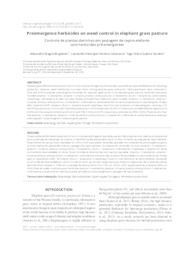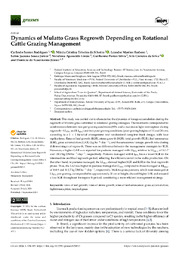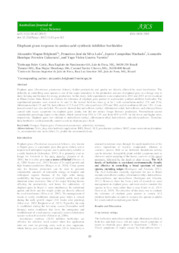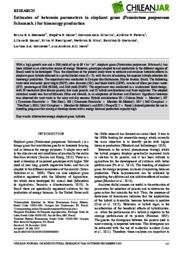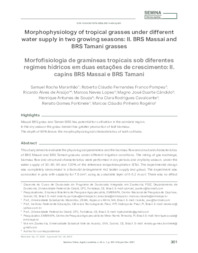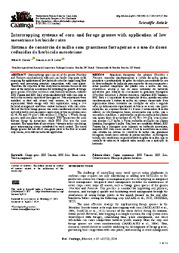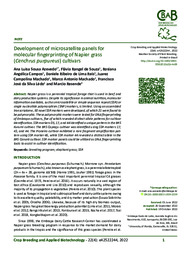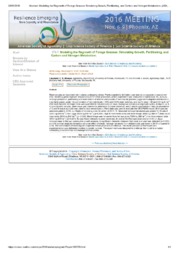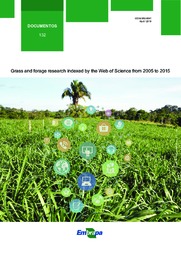Search Publications
Filter by:
| Author(s): SILVA, S. A. C. G. da; SANTOS, A. G. dos; SILVA, S. S. L.; LOGES, V.; SOUZA, F. H. D. de The objective of this study was to characterize eight accessions of Brazilian native grasses, namely Axonopus parodii (AP 01), Paspalum notatum (PN 01, PN 02, PN 03, PN 04, PN 05 and PN 06) and P. lep... ... |
| Author(s): BRIGHENTI, A. M.; CALSAVARA, L. H. F.; VAROTTO, Y. V. G. Elephant grass (Pennisetum purpureum Schum.) is an important forage crop that has been proposed as a potential feedstock for bioenergy production. However, weed interference is a major factor limiting... ... |
| Author(s): RODRIGUES, C. S.; SILVEIRA, M. C. T. da; BARBERO, L. M.; SOUSA JÚNIOR, S. J.; LIMÃO, V. A.; SILVA, G. P.; SILVA, S. C. da; NASCIMENTO JÚNIOR, D. do This study was carried out to characterize the dynamics of forage accumulation during the regrowth of Mulatto grass submitted to rotational grazing strategies. The treatments corresponded to combinati... ... |
| Author(s): BRIGHENTI, A. M.; LEDO, F. J. da S.; MACHADO, J. C.; VAROTTO, Y. V. G. Abstract Elephant grass (Pennisetum purpureum Schum.) fodder productivity and quality are directly affected by weed interference. The difficulty in controlling weed species is one of the major limitat... ... |
| Author(s): MENEZES, B. R. S.; DAHER, R. F.; GRAVINA, G. de A.; PEREIRA, A. V.; SOUSA, L. B.; RODRIGUES, E. V.; SILVA, V. B.; GOTTARDO, R. D.; SCHNEIDER, L. S. A.; NOVO, A. A. C. With a high growth rate and a DM yield of up to 80 t ha-1 yr-1, elephant grass (Pennisetum purpureum Schumach.) has been utilized as an alternative source of energy. However, genotypes adapted to and... ... |
| Author(s): MARANHÃO, S. R.; POMPEU, R. C. F. F.; ARAÚJO, R. A. de; LOPES, M. N.; SOUZA, H. A. de; CAVALCANTE, A. C. R.; FONTINELE, R. G.; ROGERIO, M. C. P. Abstract: This study aimed to evaluate the physiological parameters and the biomass flow and structural characteristics of BRS Massai and BRS Tamani grasses under different irrigation conditions. The... ... |
| Intercropping systems of corn and forage grasses with application of low mesotrione herbicide rates. Author(s): CORREIA, N. M.; LENZA, R. A. do B. ABSTRACT - Sowing forage grass species of the genera Urochloa and Panicum simultaneously with corn can hinder crop grain yield, requiring the application of low herbicide rates for suppressing their g... ... |
| Author(s): AZEVEDO, A. L. S.; SOUZA, F. R. de; CAMPOS, R. A.; REIS, D. R. de L.; MACHADO, J. C.; MACHADO, M. A.; LEDO, F. J. da S.; RESENDE, M. Napier grass is a perennial tropical forage that is used in beef and dairy production systems. Despite its significance in animal nutrition, molecular information available, such as microsatellite or... ... |
| Author(s): MORENO, L. S. B.; BOOTE, K. J. Reserves play an important role in plants undergoing stress. Plants adapted to defoliation use reserve compounds to regrow leaf area. Modeling grass regrowth should account for these processes. A fiel... ... |
| Author(s): SANTOS, P. M.; DIAS FILHO, M. B.; MACHADO, J. C.; MATTA, F. de P.; RAMOS, A. K. B.; EUCLIDES, V. P. B.; BENDAHAN, A. B.; PEREZ, N. B.; CAVALCANTE, A. C. R.; PEDROCHI, M. A.; JUSTINO, T. da S. Beef and milk production in Brazil is mainly pasture-based (Assis et al., 2005; ABIEC, 2018; FERRAZ; FELÍCIO, 2010). There is around 160 million ha of pasturelands in Brazil, which represents 45% of t... ... |
Observation
Some of Embrapa's publications are published as ePub files. To read them, use or download one of the following free software options to your computer or mobile device. Android: Google Play Books; IOS: iBooks; Windows and Linux: Calibre.
Access other publications
Access the Agricultural Research Database (BDPA) to consult Embrapa's full library collection and records.
Visit Embrapa Bookstore to purchase books and other publications sold by Embrapa.


